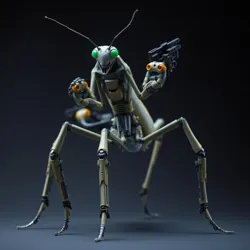Mantis Class Combat Units

Mantis Class Combat Units (MCCUs) are advanced biomechanical warfare systems developed in 2159 as part of the Synthetic Arthropod Initiative. These sophisticated machines combine the predatory efficiency of the praying mantis with cutting-edge robotics and weapons systems.
Design and Capabilities
Standing at approximately 2.5 meters tall, MCCUs feature a reinforced titanium-chitin composite exoskeleton and advanced optical systems capable of tracking up to 300 targets simultaneously. Their primary weapons are modified forearms equipped with plasma-edge blades and integrated quantum targeting systems.
The units are powered by miniaturized thoracic fusion cores that provide up to 72 hours of continuous operation. Their neural networks, based on the Hive Mind Architecture 2.0, allow for both autonomous operation and seamless integration with human operators through neural interface pods.
Applications
Military Operations
MCCUs excel in both urban combat and wilderness warfare scenarios. Their ability to scale vertical surfaces and execute precise strikes has made them invaluable for special operations. The units are typically deployed in groups of three, known as Mantis Strike Teams.
Medical Applications
Despite their military origins, MCCUs have found surprising success in medical applications. Their precise control and advanced optical systems make them excellent surgical assistants, particularly in microsurgery procedures. The Medical Mantis Program has successfully adapted combat units for use in civilian hospitals.
Development History
The first prototype, designated MK-1, was developed by Arthropod Dynamics Lab in collaboration with Neo-Tokyo Synthetics. After successful field trials, the program expanded rapidly, leading to the current MK-3 model widely used today.
Technical Specifications
- Height: 2.5 meters
- Weight: 385 kg
- Operating Temperature: -40°C to 85°C
- Primary Power Source: Mark IV Thoracic Fusion Core
- Secondary Power Source: Solar-Chitin Arrays
- Neural Processing Units: 12
- Combat Range: 500 meters
See Also
- Scorpion Class Defense Units
- Biomechanical Warfare Systems
- Synthetic Combat Evolution
References
- Advanced Arthropod Engineering Quarterly
- Combat Biomechanics: A Comprehensive Guide
- The Rise of Synthetic Warriors